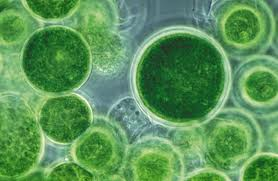Algae (Latin for seaweed) are a diverse and large group of simple organisms similar to plants except that they lack many of the structures that characterize land plants – leaves and roots for example.
Algae are harvested for a wide range of purposes including food production, fertilizer, pigments, and stabilizing agents. Seaweed is harvested for use as a fertilizer, soil conditioner and livestock feed. Seaweed is also an important food source, especially in Asia – it provides many vitamins including A, B and C and is rich in iodine, potassium, iron, magnesium and calcium. If you visit the health food store, you will see seaweed derived nutritional supplements including Spirulina and Chlorella. Ever heard of agar? It’s a gelatinous substance derived from red algae and is used widely commercially. Red algae also delivers carrageenan, which is used as a stabilizer in milk products.
When it comes to skin care, the nutrients and properties of algae make it useful as an emollient or an antioxidant. However, claims regarding its benefits to wrinkles, skin damage, et cetera, are unsubstantiated. In fact, some algae can irritate skin. Algae comes with skin benefits; it just isn’t the miracle it’s often touted to be.



